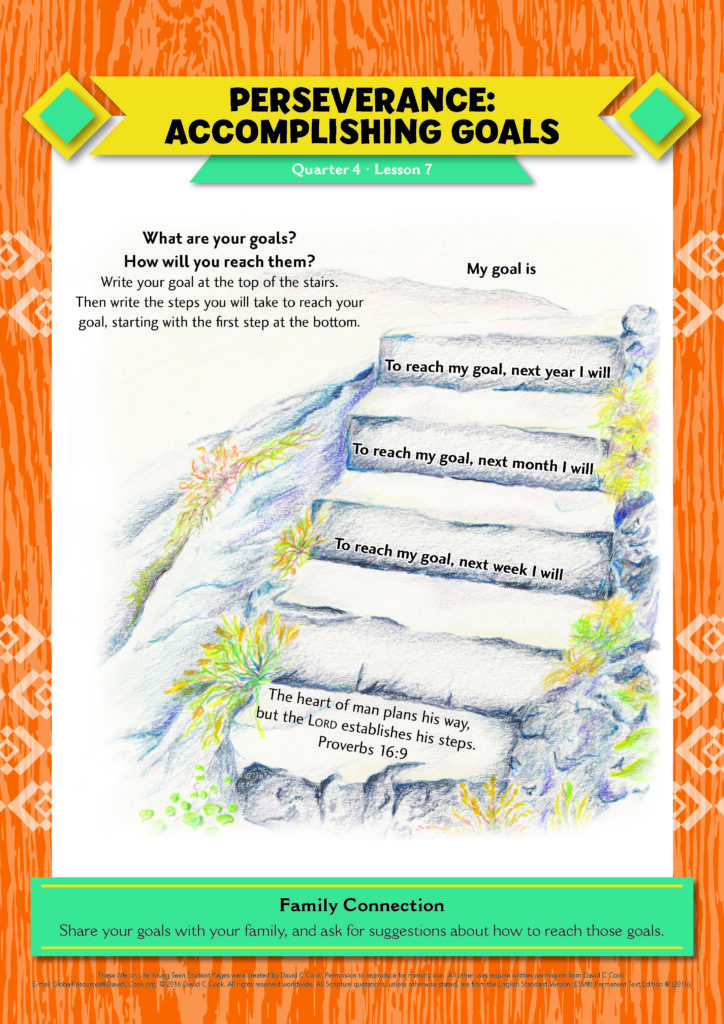During the lesson, the information for you to know is written in regular type, and what we suggest speaking or reading aloud to children is in bold. All resources for this lesson, including the Teacher Guide, Student Page, Family Connection Card, and other resources can be downloaded in a ZIP file by clicking on the following link:
In some lessons you will find "resource articles." These are articles written by experts from around the world to help equip you for your work with children and adolescents. Share them with parents or guardians if you consider it appropriate.
But as for you, be strong and do not give up, for your work will be rewarded.
2 Chronicles 15:7
Think about your proudest moment. What preceded it? Usually the things we had to work the hardest or longest for are the things that we are proudest of. God’s Word encourages us in that hard work. What goals do you have that will require you to take courage and be strong? What would you like to achieve so much that you are willing to work hard for it? Being intentional about setting goals is 1 of the surest ways to achieve a positive outcome.
Set some goals today. As you do, be sensitive to the leading of the Holy Spirit in your heart.
Encourage teens to share their goals with their families. They can ask their family members for suggestions about how to reach their goals.
Teacher Tip: If possible, email or text the Family Connection Card to the families of your students.
Welcome your teens. Tell them to stand in groups of 3 in an open space for an activity.
Decide which person in each group will be the judge. The other 2 should decide on a physical challenge. For example, who can persevere to do the most jumping jacks or sit-ups, or who can hop for the longest on 1 foot?
Judges, have your first contestant begin the challenge, and keep track of her progress. The second contestant should then try to beat her record.
Allow the students to complete the activity. Then ask them to switch roles and do the activity again 2 more times so that each student has been the judge, the first participant, and the second participant. As the students do the activity, use a clock with a second hand or count slowly to time the participants.
Gather all the teens in a circle.
One of the reasons it may have been easier to be the second person is because that person had a goal. Goals are markers we set to measure our accomplishments or our effort. Today we will talk about how setting goals can help us to persevere.
Setting goals is an important part of perseverance. We may set goals based on our dreams, our ambitions, and our expectations for the future. When we have a goal, we are usually more motivated to continue to move forward, even when doing so is difficult. Listen to these tips to help you learn how to persevere.
Tip 1: Have hope.
Ask a student to read Hebrews 10:35–36 aloud from the Bible.
So do not throw away your confidence; it will be richly rewarded. You need to persevere so that when you have done the will of God, you will receive what he has promised.
Hebrews 10:35–36
Students may answer that they will not know what goals to set if they do not hope for things in life.
Students may answer that if we persevere and do not grow weary, we will eventually experience rewards for our efforts.
Hope allows you to plan and dream. It keeps you moving toward your goals when you are struggling through difficult times. Hope can be based on realistic dreams, such as wanting to earn enough to feed your family, or on harder-to-reach dreams, such as becoming a doctor. Both kinds of hope are valuable because they give us a desire to continue to learn and grow.
Tip 2: Pray.
Ask a student to read Proverbs 16:9 aloud from the Bible.
Show the Memory Verse poster, if you are using it.
In their hearts humans plan their course, but the Lord establishes their steps.
Proverbs 16:9

Students may answer that while it is good to make plans, the Lord is the One who will direct our future.
The Bible tells us that we should have hope for the future and make plans, but our future is in God’s hands. When we make plans, we should always be sure we ask for His guidance as we move forward.
Tip 3: Take the first step.
Ask a student to read Luke 14:28 aloud from the Bible.
Suppose one of you wants to build a tower. Won’t you first sit down and estimate the cost to see if you have enough money to complete it?
Luke 14:28
Students may answer that we should consider all of the steps to reach our goals and begin with the first step after planning and estimating the cost. Point out that Jesus was telling people to carefully consider their decisions before making the commitment to follow Him.
The journey to reach a goal is made up of lots of little steps. Think about your bigger goals, such as finishing secondary school. Then set smaller goals to reach them, such as spending 15 minutes more each night doing your math homework or studying for your final certificate examination for at least 1 hour each week.
Tip 4: Be positive.
Ask a student to read 1 Thessalonians 5:16–18 aloud from the Bible.
Rejoice always, pray continually, give thanks in all circumstances; for this is God’s will for you in Christ Jesus.
1 Thessalonians 5:16–18
Students may answer that rejoicing and being thankful in all circumstances can help us have hope and resilience.
It is important to set goals and to be positive about them. Being positive, even when things do not seem good, is a choice. Use phrases such as “I will” instead of “I will not.” Think about the things you have already accomplished that will make reaching your goals easier—and celebrate the small successes, rejoicing and giving thanks for each step you achieve. This will help to motivate you to persevere when your goals take longer than you expected or when you encounter obstacles.
Tip 5: Learn from your mistakes.
Ask a student to read Proverbs 11:2 aloud from the Bible.
When pride comes, then comes disgrace, but with humility comes wisdom.
Proverbs 11:2
Students may answer that we need to be humble and willing to learn from what we have done wrong.
Students may answer that learning from others and learning from our mistakes require humility and that these are good ways to learn.
You can turn your mistakes into victories by learning from them. Think about what you have done well, and consider ways to improve on what you have not done as well. If you do not succeed in reaching your goal, set a new goal based on what you have learned. You will be more successful when your goals are realistic and based on your past experiences.
Thinking about goals for the future can help us to persevere today. I will read 2 situations. In each situation, 1 teen perseveres and 1 does not persevere. We will contrast the teens’ possible futures.
Have teens sit in pairs. Explain that you will read 2 situations that might happen in real life. Then the pairs will discuss the questions you ask. Allow 2–3 minutes to discuss the first situation. Then read the second situation and questions and give the teens 2–3 minutes to discuss.
Optional: Give each student a piece of paper and a pencil. Have each teen write down his goals and the steps required to accomplish this goal. The teens should write:
My goal is ____________________.
To reach my goal, next week I will _______________.
To reach my goal, next month I will ______________.
To reach my goal, next year I will ________________.
Encourage your students to look at these papers often to help them remember to work on accomplishing their goals.
If you are using the Student Pages, the teens can write their goals down on these pages.

Listen to these verses from the Bible. In the first verse, God talks to us, and in the second one, we talk to God.
God has said, “Never will I leave you; never will I forsake you.” So we say with confidence, “The Lord is my helper; I will not be afraid.”
Hebrews 13:5–6
Students may answer that God will persevere in loving us and always being with us.
Students may answer that we can have confidence in our difficult situations because we know He will help us if we ask.
Work with your partner to memorize these verses.
Have the teens work with their partners to memorize Hebrews 13:5–6. You can read it to them again several times. After 3–4 minutes, close your class time by praying a blessing over the teens based on Hebrews 13:5–6.
Blessing: May the God who will never leave you nor forsake you give you the strength to persevere toward your goals. May He remind you that He will stand next to you in your difficulties, so you do not have to be afraid.
Lead the teens in singing this quarter’s song if possible.
Life on Life ©2020 David C Cook. Reproducible for home or classroom use only. All other uses require written permission from David C Cook [email protected]. All rights reserved.